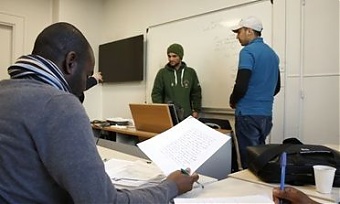Culture, Estonia, EU – Baltic States, Legislation, Society, Transport
International Internet Magazine. Baltic States news & analytics
Wednesday, 08.05.2024, 02:58
Arrival of first refugees in Estonia went smoothly
 Print version
Print version |
|---|
Kuut told reporters at a press conference on Tuesday evening that the seven people arrived on a regular flight. "Their arrival in Estonia went as expected," he said.
The official pointed out that interest in the whereabouts of these individuals may still have not waned in the countries that they fled from. It is also in the interest of internal security that data on the refugees was kept from becoming available to a wide circle of persons, he added.
Kuut urged everyone to be tactful and discreet when it comes to the refugees.
Estonia on March 29th accepted the first seven people - a family of five from Iraq and one man from Syria and Yemen each - to be relocated here as part of the EU refugee relocation program. They will be given accommodation in Tallinn and in Tartu.
Kuut said the man from Syria has worked in catering and is fluent in English, in addition to Arabic. The man from Yemen has a higher education degree in English language and has worked as a journalist. The man from Iraq has worked in construction and transport. His wife has been a homemaker. Their children of school age have participated in school work earlier. The family speaks Arabic.
All the refugees that arrived in Estonia have passed a background check and interviews have been conducted with them in Greece in the course of which they have been informed about Estonia as a country and its customs, spokespeople for the Interior Ministry said.
All of them have expressed the wish to go to Estonia and have displayed very big interest in the country, Kuut said.
All the seven individuals have been granted the status of supplementary protection, which entails a one-year residence permit with the possibility of extension.
Spokespeople for the ministries of interior and social affairs have said also earlier that the relocated refugees will not be taken to a refugee accommodation center but directly to a dwelling provided by the government.
The Interior Ministry has urged the media to respect the privacy of the refugees.
The refugees will be paid social welfare subsidies in Estonia on an equal footing with Estonian residents. In addition they will be compensated for rent, cost of necessary translation services and of learning the Estonian language during two years from the issuance of a residence permit.
In addition, Greece has presented to Estonia the files of 12 persons hailing from Syria, Yemen and Iraq. They include three families and one single man.
The law enforcement agencies of Estonia will do everything to ensure the safety of the war refugees that have arrived and are about to arrive in Estonia, the country's chief refugee official said on Tuesday.
"It's us with our agencies that are responsible for making sure that they are safe here," Raivo Kuut, deputy secretary general of the Estonian Interior Ministry for law enforcement and migration policy, told a press conference Tuesday evening.
"Our law enforcement institutions and security institutions are performing their duties in Estonia on a daily basis, are constantly making risk estimates, monitoring the situation in different places of Estonia. By doing this law enforcement institutions are ready to respond should the need for additional or different kind of action arise," Kuut said speaking of the authorities' response in a situation where someone attempts to disturb the peace of the people who have been granted international protection in Estonia.
The man from Syria has worked in catering and is fluent in English, in addition to Arabic. The man from Yemen has a higher education degree in English language and has worked as a journalist. The man from Iraq has worked in construction and transport. His wife has been a homemaker. Their children of school age have participated in school work earlier. The family speaks Arabic.
The children of the Iraqi refugee family that arrived in Estonia on Tuesday will not go to school for the time being and their educational background and needs will be ascertained in the course of a student evaluation, officials said on Tuesday.
"There's no point in starting looking for a school for these children to go to right away. The important thing is for the children and the parents to get accustomed to the culture and their dwelling first," Irene Kaosaar, head of the department for general education at the Ministry of Education and Research, told a press conference.
Kaosaar said that when all the essential health checks have been completed a student evaluation will be carried out to establish how it's best to integrate the children into the Estonian education system.
"They have some kind of school experience, but it's not exactly known how consistent their knowledge and skills are with our school system and curriculum," Kaosaar added.
Estonia has the obligation as an EU member state to accept 550 refugees under the EU's refugee relocation and resettlement plan.








 «The Baltic Course» Is Sold and Stays in Business!
«The Baltic Course» Is Sold and Stays in Business!

